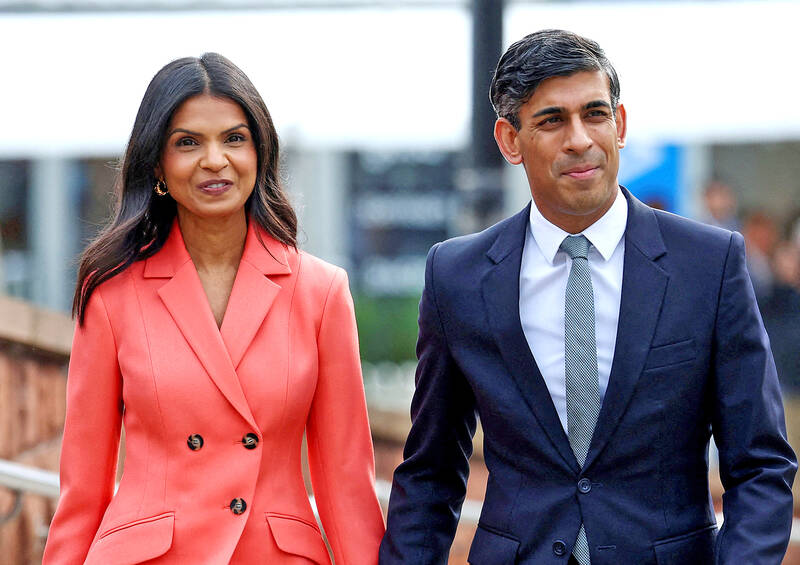British Prime Minister Rishi Sunak on Wednesday proposed raising the legal age that people in England can buy cigarettes by one year, every year until it is illegal for the whole population and smoking hopefully would be gradually phased out among young people.
Setting out his plan at the annual Conservative Party conference, Sunak said he wanted to “stop teenagers taking up cigarettes in the first place” and repeated yearly increases in the age of sale law would mean “a 14-year-old today will never legally be sold a cigarette.”
It is currently illegal for anyone to sell cigarettes or tobacco products to people under 18 years old throughout the UK.

Photo: Reuters
Sunak’s office said the incremental changes would stop children who turn 14 this year and the ones younger than that now from ever legally being sold cigarettes in England
If the British parliament approves the proposal, the legal change would only apply in England — not in Northern Ireland, Scotland and Wales.
“People take up cigarettes when they’re young. Four in five smokers have started by the time they’re 20,” he said. “Later, the vast majority try to quit ... if we could break that cycle, if we could stop the start, then we would be on our way to ending the biggest cause of preventable death and disease in our country.”
The government said that smoking will not be criminalized, and the phased changes mean that anyone who can legally buy cigarettes now would not be prevented from doing so in the future.
The number of people who smoke in the UK has declined by two-thirds since the 1970s, but about 6.4 million people in the kingdom — or about 13 percent of the population — still smoke, according to official figures.
The British government raised the legal age of sale for tobacco from 16 to 18 in 2007. That succeeded in reducing the prevalence of smoking among 16 and 17-year-olds by 30 percent, Sunak’s office said.
Health experts welcomed the British prime minister’s plan to steadily increase the legal smoking age. A similar measure was approved in New Zealand last year.
“This government’s plan to introduce ‘smoke-free generation’ legislation could become its defining legacy, righting a century-old wrong, with tobacco products being the only legally available commodity that, if used as intended, will kill over half of its lifelong users,” said Lion Shahab, an academic who codirects the tobacco and alcohol research group at University College London.
Sunak also said his government would introduce measures to restrict the availability of vapes, also known as e-cigarettes, to children.
It is currently illegally to sell vapes to people under 18 in the UK, but officials say youth vaping has tripled in the past three years and more children now vape than smoke.
Officials would look into options, including restricting flavored vapes and regulating packaging and store displays to make the products less appealing to young people.

ELECTION DISTRACTION? When attention shifted away from the fight against the militants to politics, losses and setbacks in the battlefield increased, an analyst said Recent clashes in Somalia’s semi-autonomous Jubaland region are alarming experts, exposing cracks in the country’s federal system and creating an opening for militant group al-Shabaab to gain ground. Following years of conflict, Somalia is a loose federation of five semi-autonomous member states — Puntland, Jubaland, Galmudug, Hirshabelle and South West — that maintain often fractious relations with the central government in the capital, Mogadishu. However, ahead of elections next year, Somalia has sought to assert control over its member states, which security analysts said has created gaps for al-Shabaab infiltration. Last week, two Somalian soldiers were killed in clashes between pro-government forces and

Ten cheetah cubs held in captivity since birth and destined for international wildlife trade markets have been rescued in Somaliland, a breakaway region of Somalia. They were all in stable condition despite all of them having been undernourished and limping due to being tied in captivity for months, said Laurie Marker, founder of the Cheetah Conservation Fund, which is caring for the cubs. One eight-month-old cub was unable to walk after been tied up for six months, while a five-month-old was “very malnourished [a bag of bones], with sores all over her body and full of botfly maggots which are under the

BRUSHED OFF: An ambassador to Australia previously said that Beijing does not see a reason to apologize for its naval exercises and military maneuvers in international areas China set off alarm bells in New Zealand when it dispatched powerful warships on unprecedented missions in the South Pacific without explanation, military documents showed. Beijing has spent years expanding its reach in the southern Pacific Ocean, courting island nations with new hospitals, freshly paved roads and generous offers of climate aid. However, these diplomatic efforts have increasingly been accompanied by more overt displays of military power. Three Chinese warships sailed the Tasman Sea between Australia and New Zealand in February, the first time such a task group had been sighted in those waters. “We have never seen vessels with this capability

‘NO INTEGRITY’: The chief judge expressed concern over how the sentence would be perceived given that military detention is believed to be easier than civilian prison A military court yesterday sentenced a New Zealand soldier to two years’ detention for attempting to spy for a foreign power. The soldier, whose name has been suppressed, admitted to attempted espionage, accessing a computer system for a dishonest purpose and knowingly possessing an objectionable publication. He was ordered into military detention at Burnham Military Camp near Christchurch and would be dismissed from the New Zealand Defence Force at the end of his sentence. His admission and its acceptance by the court marked the first spying conviction in New Zealand’s history. The soldier would be paid at half his previous rate until his dismissal